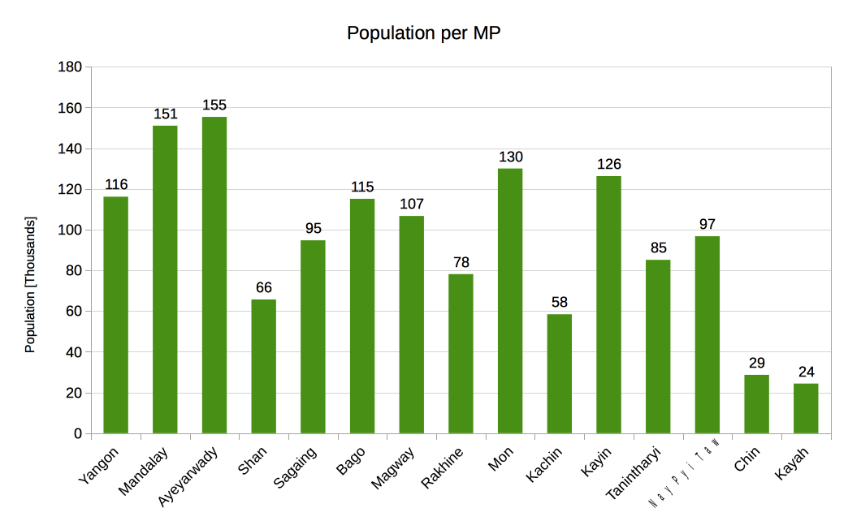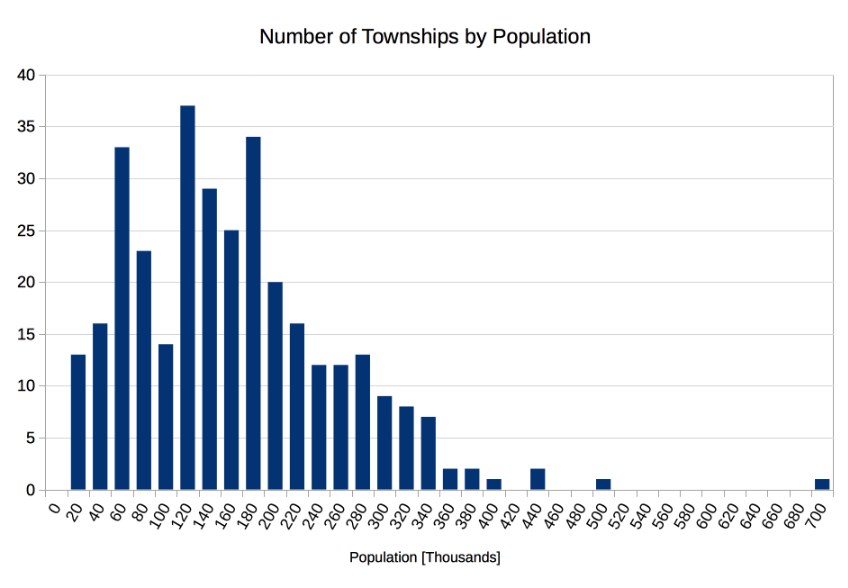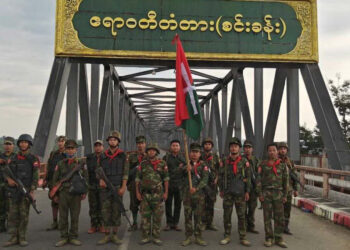RANGOON — When millions of Burmese citizens go to the polls on Nov. 8, many will be hoping their votes can help make the country a freer and fairer place after half a century of iron-fisted military rule that has impoverished a once-promising nation.
An estimated 33.5 million voters will be electing 325 Lower House parliamentarians, but a structural quirk within Burma’s electoral system means not all votes will carry equal weight: Votes in the smallest constituencies have several hundred times more influence in the Lower House than those in the country’s biggest constituencies.
This is mainly because Lower House constituencies in Burma are based on townships, whose populations vary widely.
“It’s fairly unusual to have an election with a constituency with 500,000 people and another with 5,000 people in the same election, electing the same number of seats. It’s just unfair to the population,” an election expert told Myanmar Now, declining to be named due to the sensitive nature of the topic.
Such wide disparities in population among voting districts are an electoral characteristic commonly referred to by political scientists as “malapportionment.”
Malapportionment appears to undermine the fairness of “one man, one vote,” a central tenet of democracy, and raises questions over the credibility of the electoral system and the mandate of a parliamentarian who wins a seat based on a few thousand votes, compared to another who collects hundreds of thousands of votes.
More important, however, is the concern that small electoral districts are more vulnerable to manipulation, intimidation and fraud.
“Clearly it’s easier to win a seat with a small number of voters than it is to win a seat with a large number of voters. In other words, the cost or difficulty of running a campaign is dependent partially on the size,” said Richard Horsey, a political analyst.
Malapportionment can also swing elections. Experts say in the 2013 Malaysian elections, the ruling Barisan Nasional was able to secure nearly 60 percent of all parliamentary seats due to malapportionment, despite losing the popular vote.
Speculation is already rife over how Burma’s ruling Union Development and Solidarity Party (USDP) is seeking to benefit from the electoral system’s imbalances as it tries to fend off a major defeat by Aung San Suu Kyi’s popular National League for Democracy (NLD).
High-profile ruling party ministers are contesting some of the smallest constituencies in Burma, albeit for the Upper House. Soe Thane and Aung Min, both influential ministers in President Thein Sein’s office, are running as independent candidates in Karenni State.
Not only is Karenni one of the most severely malapportioned states, the two townships which form part of their Upper House constituencies are some of the smallest in the country.
A Reuters report from September said Soe Thane had funded projects worth tens of thousands of dollars for the electorate in his tiny Bawlakhe Township constituency, including satellite dishes, water distribution and a soccer competition.
Thet Swe, a former naval chief, is running for a Lower House seat for the ruling party in tiny Cocokyun, the country’s second smallest constituency.

How Bad Is It?
A common way to measure malapportionment is to find the ratio between the eligible voters in largest constituency and those in the smallest. In Burma, that ratio, calculated using census data, is 397:1.
Myanmar Now used census data as this is the only complete data set available that allowed for further breakdowns.
The Union Election Commission (UEC) declined requests to make public the number of eligible voters in each constituency, except for the five biggest and smallest. Malapportionment in Burma based on the UEC figures is 370:1.
Either of these ratios shows “an extraordinarily high degree” of malapportionment by international standards, according to electoral experts contacted by Myanmar Now. They say the international standard is to have constituencies with populations that are as close in size to each other as possible.
“The delineation of constituencies in which elections are conducted must preserve the equality of voting rights by providing approximately the same ratio of voters to elected representatives for each district,” said the Organization for Security and Cooperation in Europe (OSCE).
In Macedonia, for example, electoral boundaries have to be redrawn if the degree of malapportionment exceeds 3 percent, according to ACE Electoral Knowledge Network, a global online resource on elections. The limits on malapportionment in the Czech Republic and Germany are 15 percent and 25 percent, respectively.
As unfair and vulnerable to manipulation as Burma’s electoral system may be in comparison, it looks set to stay for a while.
The decision to delineate by township was made by the former junta and enshrined in its 2008 Constitution. Any charter reform is unlikely soon as amendments are highly sensitive for the army. Its unelected officers control a quarter of seats in Parliament and hold a de facto veto over constitutional reform.
According to Horsey, the previous government probably resorted to the current system because it lacked population census data and designing a better balancing of constituency sizes would have been complicated. “I think it was just convenience,” he said. “I think they just took a decision to keep it at the political unit.”
Sai Kyaw Thu, director of the UEC, acknowledged the disparities in the electoral system but said a change is out of the commission’s remit.
“Yes, it’s true [that this is unfair], but that is because our constituencies are based on townships, not population. This is because of the Constitution so there is not much we can do. If there is a change in the Constitution and electoral laws, then of course we would adjust the system accordingly,” he told Myanmar Now in a phone interview from Naypyidaw.
Win Htein, spokesperson for Aung San Suu Kyi’s National League for Democracy, said while the party is concerned about malapportionment, it is focusing on discrepancies in the voter lists and advance voting as immediate issues to address.
“We know that the system is unfair but we can’t say much because the constituencies are based on townships,” he said.
Based on a total population of 51.486 million, the average township population in Myanmar is about 156,000 people, but ranges from 1,732 people in tiny Injangyang in Kachin State in the north to 687,867 residents in Rangoon’s sprawling Hlaingtharyar Township.
Myanmar Now’s analysis of census data show that a large share of the townships—82 in total representing 25 percent of all constituencies—have 78,000 people or less. On the other hand, there are 21 townships with 312,000 people or more.

Ethnic Representation Versus Malapportionment
Malapportionment may be bad electoral practice but it is not fraud and does not always have to be negative, experts say. It is also common around the world, especially in bicameral systems where the Upper House is designed to favor politically less powerful states.
Proponents say it could help to promote a regional redistribution of wealth in countries with high levels of inequality.
In Burma, a majority of small constituencies are in ethnic areas, but by no means all.
Of the 44 constituencies with less than 50,000 people, 10 are in the commercial capital Rangoon.
“If you look at [Burma’s] Upper House, malapportionment is built into the system because each region and state is given the same number of candidates or representatives regardless of population. That’s a political decision. In a multi-ethnic, diverse country, to give equal representation to everyone, in the same way the US Senate does,” said Horsey.
Changing the current situation by making Burma’s electoral districts of equal population size could create other problems, he said. It could limit the representation of ethnic groups, but also lead to gerrymandering—redrawing the electoral boundaries to serve the interests of a political party or group.
It would also require a complex process of redistribution that could take several years, whereas the general public is used to townships as administrative units, he added.
Others, however, say malapportionment is so severe under Burma’s current system that something should be done about it.
“It’s just the basic question of fairness to have people’s votes so diluted in some areas that they’re 30 times less represented or 500 times more represented,” said the election expert who declined to be named.
“That’s a huge question for the post-election period—how to address malapportionment. It has to be wrapped up in the constitutional change process, and linked to electoral reform, decentralization, and federalism. These are huge questions,” he added.

















